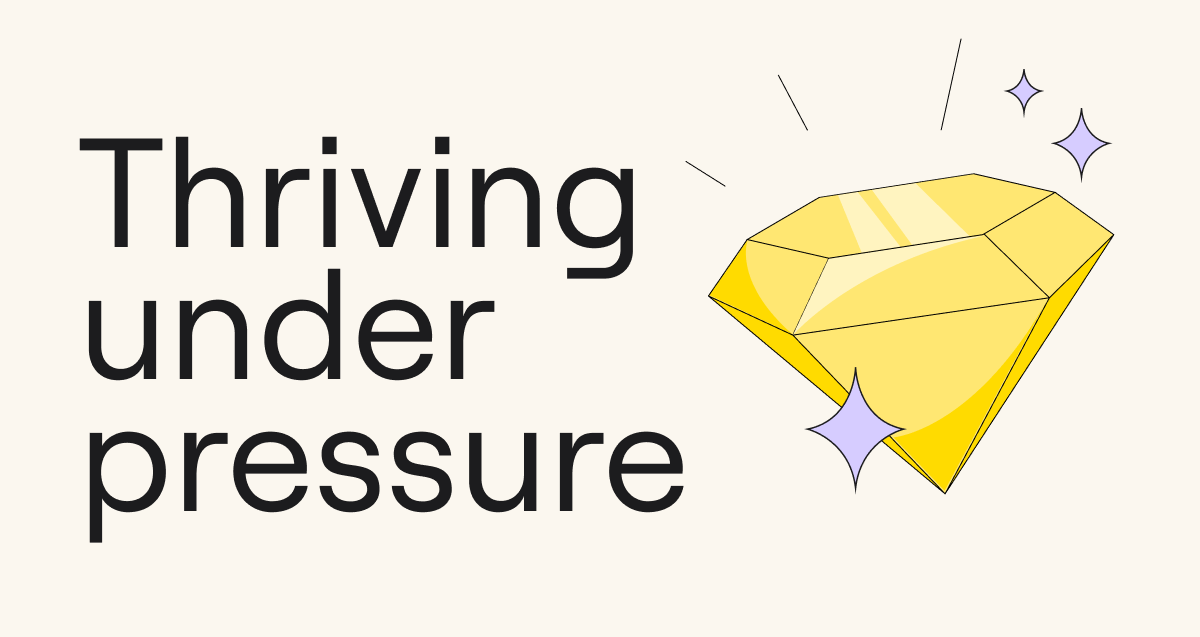Today we’re joined by Olga Baibarodskikh, Miro’s Growth Marketing Manager. In this blog, we take a deep dive into how working under pressure in a fast-paced environment can help each of us develop in our careers and thrive as a person.
I’m a strong believer that the absence of pressure can make it difficult to achieve great things. When Miro entered hypergrowth, I faced various forms of pressure and improved my ability to deal with it. Now I understand how being under pressure can push me to excel at my job and ultimately grow as an individual.
💡 In order to perform well under stress and maintain personal wellbeing it is very important to have a supportive environment, a strong leader, and a team ready to share this journey with you.
Embracing pressure for personal and professional growth
The process of accomplishing great things often involves going above and beyond. High stakes naturally come with increased pressure, like time constraints, peer pressure, managerial expectations, and the knowledge that others are counting on you.
When there are no challenges or urgency involved in a task, it is unlikely that the outcome will be remarkable. If you have all the resources and permission to fail, what’s great about that? This is why pressure, in my opinion, can bring out the best in people, but also their worst. When you perform under pressure, you learn and grow, at the same time realizing your potential.
In these high-stress situations, managers can help their employees by supporting and coaching them, setting clear goals and expectations, providing the necessary resources, and offering constructive feedback to guide their progress.
The role of pressure and failure
In the last six years of my career journey, I’ve met many amazing people leaders, managers, and mentors. They all understand the value of pressure and train their teams to perform well under stress.
Why do they do that? Often we need to be put under pressure in order to discover our capabilities and learn how to improve. Managers play a crucial role in this process by fostering a culture that encourages risk-taking, learning from mistakes, and celebrating incremental progress.
It’s inevitable to fail sometimes. Each failure is a learning experience highlighting an area for improvement. Failure teaches us that we need to practice, and better prepare for future challenges. After failing we need to put ourselves back into high-pressure situations and make a reality check to see if we’re moving in the right direction and making progress.
The beauty of teamwork in a high-pressure environment
In a team setting, it is crucial to understand how each member handles pressure. As a project manager, leader, or co-worker, it is important to recognize the struggles of others and provide support to help them overcome the difficulties and accomplish their goals.
When the bar is set so high that it seems impossible to achieve, some people can think of ways to run away from it. They delegate, try to prove the impossibility of achieving, or simply say “no” to a challenge, while others think of how to accomplish it. Luckily for me, I work with fearless professionals, who always dream big and are not afraid to work hard to at least touch that bar with one finger.
It’s very unlikely to achieve great things if you don’t feel a strong connection with your team. The key to greatness and remarkable results is empathy. No matter what title you have, or what’s at stake for you or your team, we’re all humans after all, and sometimes pressure can be overwhelming.
Being a good team player means knowing when your peer needs a hand or a talk. You are very lucky if you have a person on your team who can genuinely ask “Hey, seems like this project is very challenging, may I help?” And don’t be afraid to be that person for somebody else.
This collaborative mindset allows the entire team to thrive in a high-pressure environment, build strong relationships based on trust and compassion, and practice empathy which is an excellent social currency these days.
Balancing pressure and wellbeing
Excessive pressure can lead to burnout, decreased productivity, and negative impacts on mental health. Therefore, it is crucial for both employees and managers to recognize when an individual needs to step back from high-pressure situations and focus on self-care. Together with your manager, monitor your workload, find a way to make regular breaks, and create an open and supportive environment where you’ll feel comfortable discussing your concerns or needs for additional support.
The pressure that comes with working in a fast-growing company like Miro can be a catalyst for personal and professional growth.
By embracing challenges, learning from failure, and collaborating with others, each of us can develop the skills and resilience needed to excel in our careers. Managers play a pivotal role in helping their direct reports navigate these high-pressure situations, providing the necessary support and guidance for their employees to achieve greatness. In this way, pressure can be a transformative force that brings out the best in people and pushes them to reach their full potential.
While pressure can serve as an engine for personal and professional development, it is essential to recognize the importance of balancing it with personal well-being. Knowing when to step back from high-pressure situations and focus on self-care is crucial for maintaining overall well-being and preventing burnout.



